Sustainable Hospitality Alliance. "Pathway to Net Positive Hospitality for the Planet.". March 2022. https://sustainablehospitalityalliance.org/...
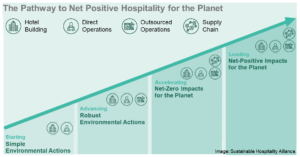 Collaboration across the value chain enables hospitality to be a powerful force for improvement, with a tangible positive impact on the environment. The Pathway has been created by the industry for the industry, in consultation with numerous stakeholders across the value chain. It offers simple and practical solutions that can be replicated by any organization and every hotel – from those just getting started to those who are leading the way in sustainable innovation in hospitality. The Pathway looks beyond having zero impact and recognizes the immense potential hospitality has in making a lasting positive impact on the planet.
Collaboration across the value chain enables hospitality to be a powerful force for improvement, with a tangible positive impact on the environment. The Pathway has been created by the industry for the industry, in consultation with numerous stakeholders across the value chain. It offers simple and practical solutions that can be replicated by any organization and every hotel – from those just getting started to those who are leading the way in sustainable innovation in hospitality. The Pathway looks beyond having zero impact and recognizes the immense potential hospitality has in making a lasting positive impact on the planet.
Posted on 02/06/22
Recent Abstracts

For critical minerals, it’s better to talk about SDGs than ESG
Economic strategies aim to drive research and innovation, develop bilateral and multilateral partnerships further economic reconciliation with indigenous peoples. Among the most recognizable values credentials companies use to demonstrate their commitment to best practices are environmental, social, and governance (ESG ...
Posted on 31/05/24

Nature Positive: Guidelines for the Transition in Cities
A crucial shift is required in urban development away from solely preventing climate change towards environmental action that protects and restores nature. Cities can advance their nature-positive transition and expedite restorative and renaturalization actions to benefit and reap the rewards of a sustainable and resi ...
Posted on 30/05/24
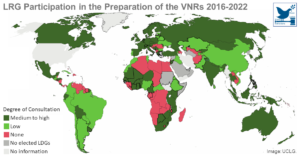
Towards the Localization of the SDGs
To accelerate SDG localization and sustainable local and regional development, national governments must urgently implement an enabling framework for subnational governments to meet their devolved responsibilities and the demands of the communities. The Sustainable Development Goals (SDGs) are a holistic agenda intend ...
Posted on 29/05/24
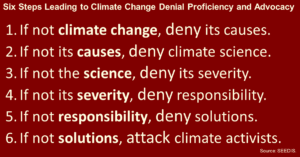
Climate Change Denial
Climate change denial is a form of science denial characterized by rejecting, refusing to acknowledge, disputing or fighting the scientific consensus on climate change. It refers to denial, dismissal, or doubt of the scientific consensus on the rate and extent of global warming, its significance, or its connection to ...
Posted on 28/05/24
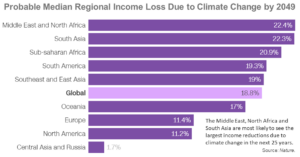
Ten Facts about the Economics of Climate Change and Climate Policy
The world’s climate has already changed measurably in response to accumulating greenhouse gas (GHG). Considerable uncertainties surround both the extent of future climate change and the biophysical impacts of such change. Despite the uncertainties, climate scientists strongly agree that in the absence of measures to si ...
Posted on 14/05/24

The differential impact of climate interventions along the political divide in 60 countries
A major barrier to climate change mitigation is the political polarization of climate change beliefs. In a global experiment, the differential impact of eleven climate interventions across the ideological divide were assessed. This paper examines the political polarization of climate change at the level of beliefs and ...
Posted on 13/05/24
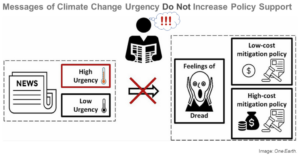
The IPCC Report and the Need for Radical Climate Action
The UN Intergovernmental Panel on Climate Change (IPCC) report demonstrates that climate breakdown is happening more quickly than anticipated and warns that much of the planet will soon become uninhabitable. The science-driven report emphasizes the urgent need for radical climate action to stay in a climate safety zon ...
Posted on 11/05/24
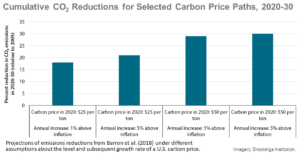
Navigating the Risks of Greenwashing in the Voluntary Carbon Market
Voluntary carbon markets (VCMs) offer an important market mechanism for firms to efficiently abate their emissions. By utilizing the VCM, they can buy verified carbon credits (VCCs) from carbon projects that have a lower marginal cost of abatement. One of the main obstacles in delivering the lowest cost abatement throu ...
Posted on 08/05/24
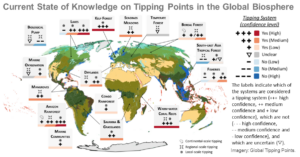
The Global Tipping Points Report 2023
The Global Tipping Points Report, launched at COP28 on 6 December 2023, is an authoritative assessment of the risks and opportunities of both negative and positive tipping points in the Earth system and society. A "tipping point" is that point at which a small change or a series of small changes or incidents becomes s ...
Posted on 08/05/24
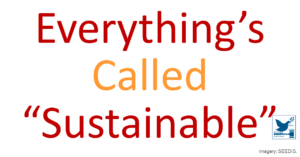
Buzzwords and Fuzzwords: Deconstructing Development Discourse
There are sustainable cities, economics, construction, destruction, investing, operation, and, inevitably, consultants – “There is nothing, it seems, that cannot be called ‘sustainable’”. A correct understanding of the term is important in the processes of policy-making and socioeconomic development as it has become a ...
Posted on 07/05/24
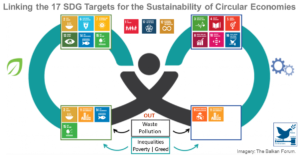
Accelerating Circular Economy Solutions to Achieve the 2030 Agenda for Sustainable Development Goals
A reduction of environmental and socioeconomic impacts of products and services can be achieved through a circular economy as a critical enabler of the sustainable use of natural resources. Systematic materials cycling for closed-loop resource supply chains and the integration of resource circularity with the SDGs is ...
Posted on 06/05/24
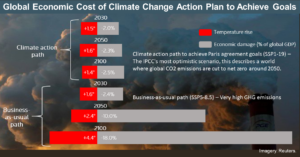
The Economic Commitment of Climate Change
Even if CO₂ emissions were drastically reduced immediately, the global economy would still be heading towards a significant drop of 19% in GDP by 2050, according to a recent study published in Nature. Scientists at the Potsdam Institute for Climate Impact Research (PIK) assessed future impacts of changing climatic con ...
Posted on 03/05/24
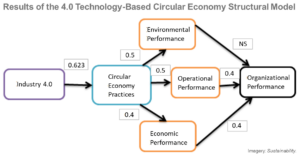
Technological Revolution and Circular Economy Practices: A Mechanism of Green Economy
Business models are being transformed by rising environmental concerns, Industry 4.0 technologies, and circular economy (CE) practices, which are the prevailing business considerations. Keeping these considerations in view, this work looks into the role of Industry 4.0 technologies in the adoption of CE practices and ...
Posted on 29/04/24
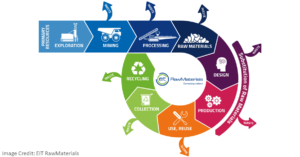
Circular Economy – Principles for Buildings Design
Circular economy principles for sustainable building design stress resource efficiency in construction to prevent and reduce construction and demolition waste and to re-use and recycle building materials and products. This document informs the key participants in the building value chain about sustainable building des ...
Posted on 26/04/24
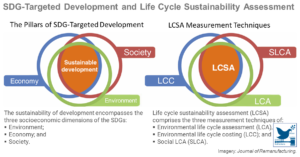
Life Cycle Costing: Evaluate Sustainability Outcomes for Building and Construction Sector
Life-cycle cost (LCC) is the sum of all costs related to the life cycle of a building from investment to its deconstruction. For a sustainable building, it is anticipated that the environmental impacts associated with the design, construction, and operation of this building are lower than conventional construction. L ...
Posted on 25/04/24

